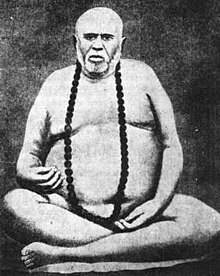
Trailinga Swami (also Tailang Swami, Telang Swami was a Hindu yogi and mystic who lived in Varanasi India. [1]

Trailinga Swami (also Tailang Swami, Telang Swami was a Hindu yogi and mystic who lived in Varanasi India. [1]
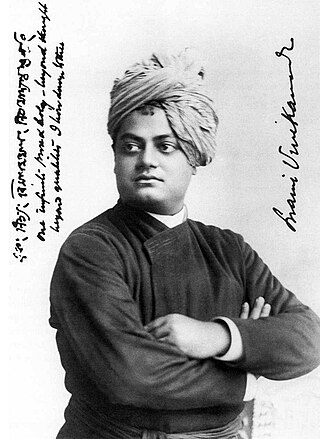
Swami Vivekananda, born Narendranath Datta, was an Indian Hindu monk, philosopher, author, religious teacher, and the chief disciple of the Indian mystic Ramakrishna. He was a key figure in the introduction of Vedanta and Yoga to the Western world, and the father of modern Indian nationalism who is credited with raising interfaith awareness and bringing Hinduism to the status of a major world religion.

Swami Dayananda Saraswati was a renunciate monk of the Hindu Saraswati order of sannyasa. He was also known as Pujya Swamiji and was a traditional teacher of Advaita Vedanta. He was the founder of the Arsha Vidya Gurukulams in Pennsylvania, USA; Rishikesh, Uttarakhand and Coimbatore Tamil Nadu, India. He was also the spiritual Guru of Prime Minister Narendra Modi. He was awarded the Padma Bhushan,, for his service to the nation in the field of spiritualism in 2016.

Swami Chinmayananda Saraswati, born Balakrishna Menon; 8 May 1916 – 3 August 1993, was a Hindu spiritual leader and a teacher. In 1951, he founded Chinmaya Mission, a worldwide nonprofit organisation, in order to spread the knowledge of Advaita Vedanta, the Bhagavad Gita, the Upanishads, and other ancient Hindu scriptures. Through the Mission, Chinmayananda spearheaded a global Hindu spiritual and cultural renaissance that popularised these spiritual texts and values, teaching them in English all across India and abroad.

Sivananda Saraswati was a yoga guru, a Hindu spiritual teacher, and a proponent of Vedanta. Sivananda was born in Pattamadai, in the Tirunelveli district of Tamil Nadu, and was named Kuppuswami. He studied medicine and served in British Malaya as a physician for several years before taking up monasticism.

Sister Nivedita was an Irish teacher, author, social activist, school founder and disciple of Swami Vivekananda. She spent her childhood and early youth in Ireland. She was engaged to marry a Welsh youth, but he died soon after their engagement.
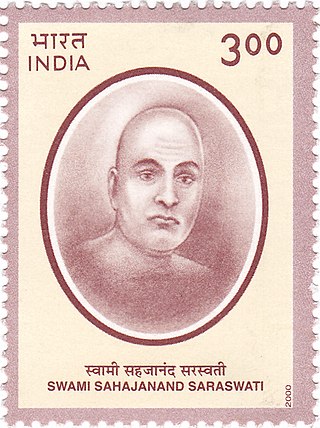
Sahajanand Saraswati was an ascetic, a nationalist and a peasant leader of India. Although born in United Provinces, his social and political activities focussed mostly on Bihar in the initial days, and gradually spread to the rest of India with the formation of the All India Kisan Sabha. He had set up an ashram at Bihta, near Patna, Bihar carried out most of his work in the later part of his life from there. He was an intellectual, prolific writer, social reformer and revolutionary.

Pramukh Swami Maharaj was the guru and Pramukh, or president, of the Bochasanwasi Akshar Purushottam Swaminarayan Sanstha (BAPS), a major branch of the Swaminarayan Sampradaya, a Hindu denomination. BAPS regards him as the fifth spiritual successor of Swaminarayan, following Gunatitanand Swami, Bhagatji Maharaj, Shastriji Maharaj, and Yogiji Maharaj. He was believed by his followers to be in constant communion with Swaminarayan, and ontologically, the manifestation of Akshar, the eternal abode of Swaminarayan.
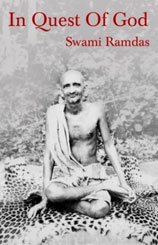
Swami Ramdas (; Sanskrit: स्वामी रामदास, romanized: Svāmī Rāmadāsa, born Vittal Rao was an Indian saint, philosopher, philanthropist and pilgrim.
Kumili is a historical village and panchayat in Pusapatirega mandal of Vizianagaram district, Andhra Pradesh, India.

Jayatirtha Das, formerly Jayatirtha Swami was one of the leading disciples of A. C. Bhaktivedanta Swami Prabhupada and a guru within the International Society for Krishna Consciousness. Born James Edward Immel and also known as Bhakti Vijaya Acharya and Tirthapada, Jayatirtha was appointed a life trustee of the Bhaktivedanta Book Trust by his guru, Prabhupada, who also placed him in the managerial post of the fledgling Spiritual Sky company. Under Jayatirtha's able management the company became a multimillion-dollar concern and the Wall Street Journal covered the company's success with a front-page article.
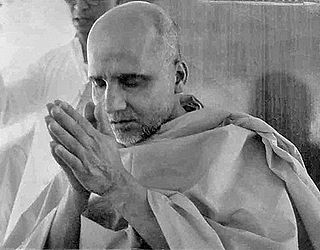
Swami Krishnananda Saraswati (IAST: Swāmī Kṛṣṇānanda Sarasvatī, 25 April 1922 – 23 November 2001) was a disciple of Sivananda Saraswati and served as the General Secretary of the Divine Life Society in Rishikesh, India from 1958 until 2001. Author of more than 40 texts, and lecturing extensively, on yoga, dharma, and metaphysics, Krishnananda was a prolific theologian, saint, yogi and philosopher.
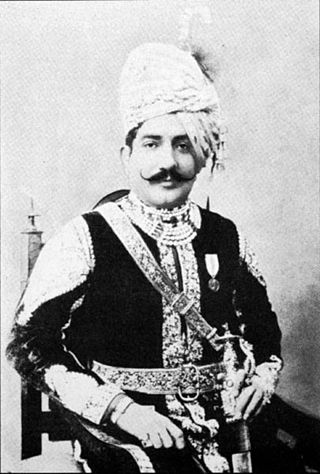
Raja Ajit Singh Bahadur was the ruler of the Shekhawat estate (thikana) of Khetri at Panchpana in Rajasthan between 1870 and 1901. He was born on 16 October 1861 at Alsisar. His father was Thakur Chattu Singh, a resident of Alsisar. Ajit Singh was later adopted to Khetri and after the death of Fateh Singh, he became the eighth king of Khetri in 1870. In 1876, he married Rani Champawatiji Sahiba and the couple had one son and two daughters. He died on 18 January 1901 due to an accident at the tomb of Akbar in Sikandra near Agra and was cremated at Mathura.

Josiah John Goodwin was a British stenographer and a disciple of Indian philosopher Swami Vivekananda. Goodwin is known for recording Vivekananda's speeches, and it is thought that without his efforts most of Vivekananda's works would have been lost.

Swami Nigamananda Paramahansa was an Indian yogi, guru and mystic in Eastern India. He is associated with the Shakta tradition and a spiritual master of vedanta, tantra, yoga and prema or bhakti. His followers referred him as Thakura.

Bijoy Krishna Goswami, also known by the honorific Gosaiji, was a Hindu social reformer and religious figure in India during the British period.

My Master is an English book combined from two lectures delivered by Swami Vivekananda in New York and England, published in 1901.

Swami Vivekananda, the nineteenth-century Indian Hindu monk, is considered one of the most influential people of modern India and Hinduism. Rabindranath Tagore suggested to study Vivekananda's works to learn about India. Indian independence activist Subhas Chandra Bose regarded Vivekananda as his spiritual teacher. Mahatma Gandhi said that after reading the works of Vivekananda, his love for his nation became a thousand-fold.
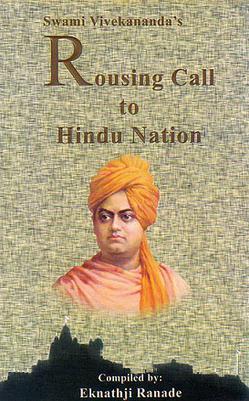
Rousing Call to Hindu Nation or Swami Vivekananda's Rousing Call to Hindu Nation (1963) is a compilation of Indian Hindu monk Swami Vivekananda's writings and speeches edited by Eknath Ranade the leader of Rashtriya Swayamsevak Sangh. The book was published in 1963, in the birth centenary of Vivekananda. Ranade dedicated the book as a "personal homage to the great patriot-saint" Swami Vivekananda.
In 1888, Swami Vivekananda left the monastery as a Parivrâjaka— the Hindu religious life of a wandering monk, "without fixed abode, without ties, independent and strangers wherever they go". His sole possessions were a kamandalu, staff and his two favourite books: the Bhagavad Gita and The Imitation of Christ. Narendra travelled extensively in India for five years, visiting centres of learning and acquainting himself with diverse religious traditions and social patterns. He developed sympathy for the suffering and poverty of the people, and resolved to uplift the nation. Living primarily on bhiksha (alms), Swami Vivekananda travelled on foot and by railway. During his travels he met, and stayed with Indians from all religions and walks of life: scholars, dewans, rajas, Hindus, Muslims, Christians, paraiyars and government officials.